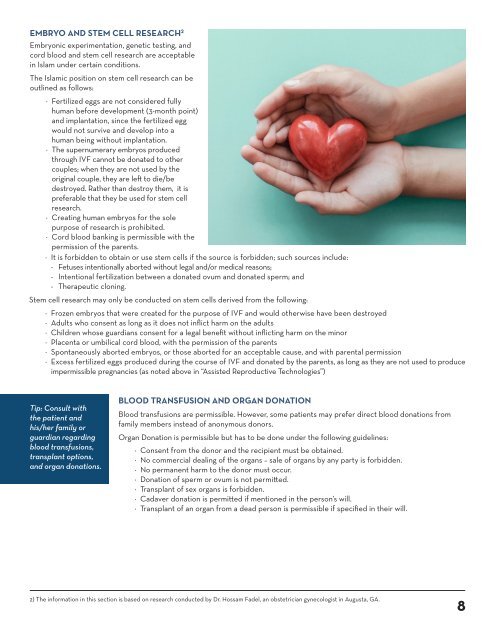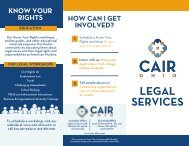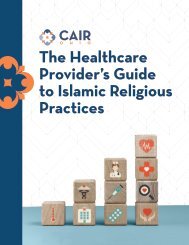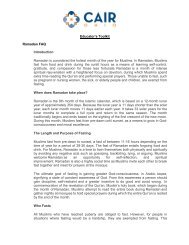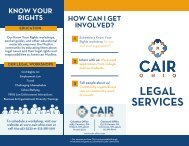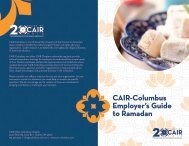CAIR-Ohio-Healthcare-Providers-Guide
You also want an ePaper? Increase the reach of your titles
YUMPU automatically turns print PDFs into web optimized ePapers that Google loves.
EMBRYO AND STEM CELL RESEARCH 2<br />
Embryonic experimentation, genetic testing, and<br />
cord blood and stem cell research are acceptable<br />
in Islam under certain conditions.<br />
The Islamic position on stem cell research can be<br />
outlined as follows:<br />
− Fertilized eggs are not considered fully<br />
human before development (3-month point)<br />
and implantation, since the fertilized egg<br />
would not survive and develop into a<br />
human being without implantation.<br />
− The supernumerary embryos produced<br />
through IVF cannot be donated to other<br />
couples; when they are not used by the<br />
original couple, they are left to die/be<br />
destroyed. Rather than destroy them, it is<br />
preferable that they be used for stem cell<br />
research.<br />
− Creating human embryos for the sole<br />
purpose of research is prohibited.<br />
− Cord blood banking is permissible with the<br />
permission of the parents.<br />
− It is forbidden to obtain or use stem cells if the source is forbidden; such sources include:<br />
- Fetuses intentionally aborted without legal and/or medical reasons;<br />
- Intentional fertilization between a donated ovum and donated sperm; and<br />
- Therapeutic cloning.<br />
Stem cell research may only be conducted on stem cells derived from the following:<br />
− Frozen embryos that were created for the purpose of IVF and would otherwise have been destroyed<br />
− Adults who consent as long as it does not inflict harm on the adults<br />
− Children whose guardians consent for a legal benefit without inflicting harm on the minor<br />
− Placenta or umbilical cord blood, with the permission of the parents<br />
− Spontaneously aborted embryos, or those aborted for an acceptable cause, and with parental permission<br />
− Excess fertilized eggs produced during the course of IVF and donated by the parents, as long as they are not used to produce<br />
impermissible pregnancies (as noted above in “Assisted Reproductive Technologies”)<br />
Tip: Consult with<br />
the patient and<br />
his/her family or<br />
guardian regarding<br />
blood transfusions,<br />
transplant options,<br />
and organ donations.<br />
BLOOD TRANSFUSION AND ORGAN DONATION<br />
Blood transfusions are permissible. However, some patients may prefer direct blood donations from<br />
family members instead of anonymous donors.<br />
Organ Donation is permissible but has to be done under the following guidelines:<br />
− Consent from the donor and the recipient must be obtained.<br />
− No commercial dealing of the organs – sale of organs by any party is forbidden.<br />
− No permanent harm to the donor must occur.<br />
− Donation of sperm or ovum is not permitted.<br />
− Transplant of sex organs is forbidden.<br />
− Cadaver donation is permitted if mentioned in the person’s will.<br />
− Transplant of an organ from a dead person is permissible if specified in their will.<br />
2) The information in this section is based on research conducted by Dr. Hossam Fadel, an obstetrician gynecologist in Augusta, GA.<br />
8


